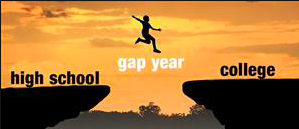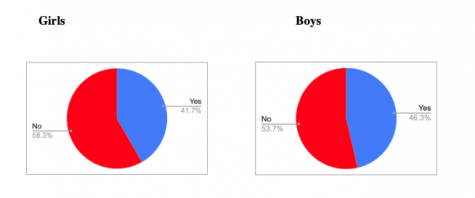Bridging the Gap: Are Seniors Taking Gap Years in Israel?

For some Ramaz Upper School graduates, this summer is a break before leaving for college. For others, college is still over a year away. Come fall, these students are looking forward to a gap year, likely in Israel to learn and explore both the country and their inner selves. A gap year between graduating high school and starting college gives students the opportunity to explore a new country, be immersed in a different culture, and learn outside the classroom.
In order to decide whether to go directly to university or take a gap year, one has to consider numerous factors that are different for each student. Some students aren’t ready to go directly to college and may need a transitional year. If the decision is made to spend a year in Israel, there are a plethora of choices to be made as well. Does the student want a more rigid learning experience, or a traveling and adventure experience? Does he or she prefer religious or secular programs, university or seminary, or the IDF? The list goes on. Fortunately, Ramaz offers a wonderful advisory committee that customizes and helps streamline the focus and decision making process.
The primary goal of the Israel Guidance Office is to work with students, offering personalized advice and aid throughout the gap year process. “We are catering to what the student is looking for. We discuss if they are interested in a gap year and why, and what they are hoping to gain from the year,” said Israel guidance counselor, Ms. Senders. Students are paired with an advisor towards the end of junior year and begin to think about what they are looking for in an Israel program. The Israel Guidance Office is also involved in helping students who are interested in serving in the Israeli Defense Forces (IDF) or Sherut Leumi, a form of community service. These students are put in contact with the Lone Soldiers Program, a program that specializes in helping non-Israeli soldiers acclimate and feel at home in Israel. Ramaz alumni and other members in the community who participated in these programs serve as additional resources.
It is important to consider whether a student is interested in a seminary/yeshiva program that has a heavier focus on learning or a program that is integrated in Israeli society: visiting kibbutzim, attending school with Israelis, and having classes taught in Hebrew. Other programs have an emphasis on connecting with the land of Israel itself, and students frequently explore outdoors, trekking to different regions in the country. The level of observance a program maintains is also important for a student to keep in mind.
In addition to being an opportunity for students to delve into their Jewish identity, the timing of a gap year in Israel is especially ideal. “After four grueling years of high school, students can have a break from the rigors of regular academic learning,” said Ms. Senders. “A gap year allows students to learn and experience things they would not have learned in the strictly defined school format.” Students are immersed in Israeli culture and history and are meeting people from various religious and ethnic backgrounds, such as Ethiopians and Sephardim. Instead of thinking of the gap year as a pause from life, Ms. Senders explains that it is “really a culmination of everything you have grown to be and learned at Ramaz. You are taking these tools and utilizing them to launch into your future.”
This year, Ms. Senders and Rabbi Schimmel advised the senior girls, while Rabbi Gober and Rabbi Weiser advised the senior boys. For the class of 2021, Ms. Rahimzada will join the team, advising girls, and Rabbi Schimmel will transfer to advising the boys. Ms. Krupka is involved on both fronts as well.
Many factors go into the decision making process—even more so this year as the COVID-19 pandemic has become a factor. It is very possible that classes in the fall of 2020 will be virtual, or at least socially distanced. Many of the community-building, social aspects of college, such as a campus Hillel/Chabad, Greek life, and even getting to know peers living in students’ dormitories, may be disrupted. The benefit of an Israel gap year, in particular for the class of 2020, is that Israel is already beginning to ease coronavirus restrictions. “Israel is further along in its process of returning to normalcy,” said Evelyn Landy ’20 “This makes the decision of a gap year more appealing.” Students will not likely be confined to their bedrooms using Zoom in Jerusalem, and will be able to bond with newly-made friends in person. Israel-bound senior Daniella Feingold ’20 affirmed, saying “Most people do not want to start their freshman year of college online.”
After taking these realities into consideration, some students are rethinking their original decision to head straight to college. Programs in Israel are accommodating this by extending their deadline to request a gap year and continuing to hold interviews for new applicants. Additional spots in programs may open up as well as some students might drop out of programs due to financial strain from the pandemic or the anxiety of traveling far away from family during these uncertain times. “Those who are considering going on a gap year have nothing to lose by reaching out to programs and institutions at this time,” said Ms. Senders. Cayla Todes ’20 said, “I was definitely considering attending an Israel program before I found out that the University of Miami [where I will be matriculating] will be starting on time in the fall, which I am very happy about.” Other students were already certain of their decision to either head straight to college or take a gap year. Avi Levy ’20 said, “I always planned on taking a gap year. I want to experience life in a different culture than what I am accustomed to.” On the other hand, for some, attending college immediately after high school can be optimal. Landy said, “I’ve always been really excited to go to college. I couldn’t wait to get to this place where I could further pursue my interests and learn new things. I felt that if I took a gap year, I would be waiting a whole year before I got to do any of that. “
Come fall, Israel programs are hoping that little will need to be modified. However, schools are willing to be flexible. Certain programs are even considering starting earlier in the year, to provide incoming students more time to acclimate before the High Holidays. Anyone who enters Israel must remain in quarantine for two weeks, so this may be built into the beginning of the program.
There is quite a bit to consider even in a stable environment. No one can predict the future. For the class of 2020, the COVID-19 pandemic has created significant uncertainty, but students are relying on conversations with programs and the Israel Guidance Office in light of the new situation in order to make an informed decision.
Experts, including faculty, educators, and Israel advisors suggest that students think seriously about their desires and expectations, and to truly self reflect on their level of maturity, educational and personal growth goals in light of the new situation to make an informed decision.
Gap Year Decisions: Class of 2020 – Who Will Be Taking a Gap Year?

Samantha is a passionate journalist and loves writing for The Rampage because it is a window into the life of the student body that honestly reports true...



